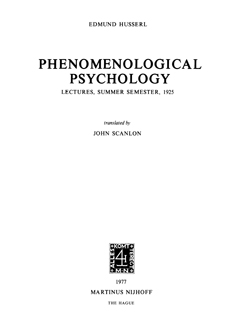This document is unfortunately not available for download at the moment.

Edmund Husserl
Austrian-German philosopher widely considered as the father of phenomenology and the phenomenological movement. In his early work, he elaborated critiques of historicism and of psychologism in logic based on analyses of intentionality. In his mature work, he sought to develop a systematic foundational science based on the so-called phenomenological reduction (époché). Husserl's thought profoundly influenced the landscape of twentieth-century philosophy and he remains a notable figure in contemporary philosophy and beyond.
Phenomenological psychology
Lectures, summer semester, 1925
Edmund Husserl
Translated by John Scanlon



